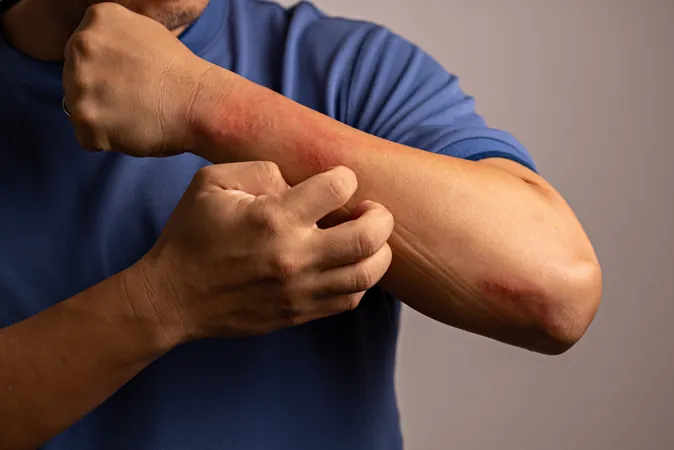
Shocking New Study Reveals High Sodium Diet May Worsen Atopic Dermatitis Symptoms!
2025-01-02
Author: Mei
Atopic Dermatitis: An Overview
Atopic dermatitis (AD), a widespread and persistent form of eczema, affects millions globally, causing skin inflammation, extreme dryness, incessant itching, and rashes. Despite ongoing research, the exact origins of AD remain elusive. However, it is widely acknowledged that a complex interplay of genetic predisposition, lifestyle factors—including dietary habits, immune system responses, and environmental triggers—contributes to its onset and severity.
The Groundbreaking Study
In a groundbreaking study conducted in the UK and published in the Journal of the American Medical Association Dermatology, researchers led by Chiang have uncovered alarming evidence linking high dietary sodium intake to an increased likelihood of developing atopic dermatitis, as well as exacerbating its symptoms. This extensive cross-sectional study analyzed 24-hour urine sodium excretion from over 215,000 participants aged 30 and older, drawing data from the UK Biobank collected between 2006 and 2010. By examining urine samples while accounting for variables like body mass index, sex, age, and other key biomarkers, the study revealed a concerning average sodium excretion of approximately 3.01 grams per day among participants, with about 5% diagnosed with AD.
Key Findings
The study’s findings are particularly striking: for each additional gram of sodium excreted within a 24-hour period, there was an 11% increased risk of developing AD, a 16% heightened chance of active dermatitis, and an 11% greater probability of experiencing more severe symptoms. This suggests that sodium may amplify inflammatory responses within the skin, fueling the very immune reactions that characterize AD.
Predicted Rise in AD Cases
Epidemiologists at GlobalData predict that the number of diagnosed prevalent cases of atopic dermatitis will rise sharply, from 42 million in 2024 to nearly 42.5 million by 2033 across seven major markets, including France, Germany, Italy, Japan, Spain, the UK, and the US. A staggering 85% of AD cases are classified as mild to moderate, while 15% are deemed severe, underscoring the pressing need for effective management strategies.
Implications and Future Directions
Given these alarming insights, there is a compelling rationale for developing accessible and practical interventions aimed at reducing sodium intake among individuals with AD. Such dietary modifications could provide a simple, cost-effective strategy to improve patient outcomes and enhance quality of life. While additional research is essential to confirm and deepen these findings, the initial results are encouraging—signaling a potential shift toward more proactive preventive measures and treatment approaches for managing atopic dermatitis.
Conclusion
Stay tuned for updates, as further investigations could unlock new pathways in combating this debilitating skin condition!





 Brasil (PT)
Brasil (PT)
 Canada (EN)
Canada (EN)
 Chile (ES)
Chile (ES)
 Česko (CS)
Česko (CS)
 대한민국 (KO)
대한민국 (KO)
 España (ES)
España (ES)
 France (FR)
France (FR)
 Hong Kong (EN)
Hong Kong (EN)
 Italia (IT)
Italia (IT)
 日本 (JA)
日本 (JA)
 Magyarország (HU)
Magyarország (HU)
 Norge (NO)
Norge (NO)
 Polska (PL)
Polska (PL)
 Schweiz (DE)
Schweiz (DE)
 Singapore (EN)
Singapore (EN)
 Sverige (SV)
Sverige (SV)
 Suomi (FI)
Suomi (FI)
 Türkiye (TR)
Türkiye (TR)
 الإمارات العربية المتحدة (AR)
الإمارات العربية المتحدة (AR)